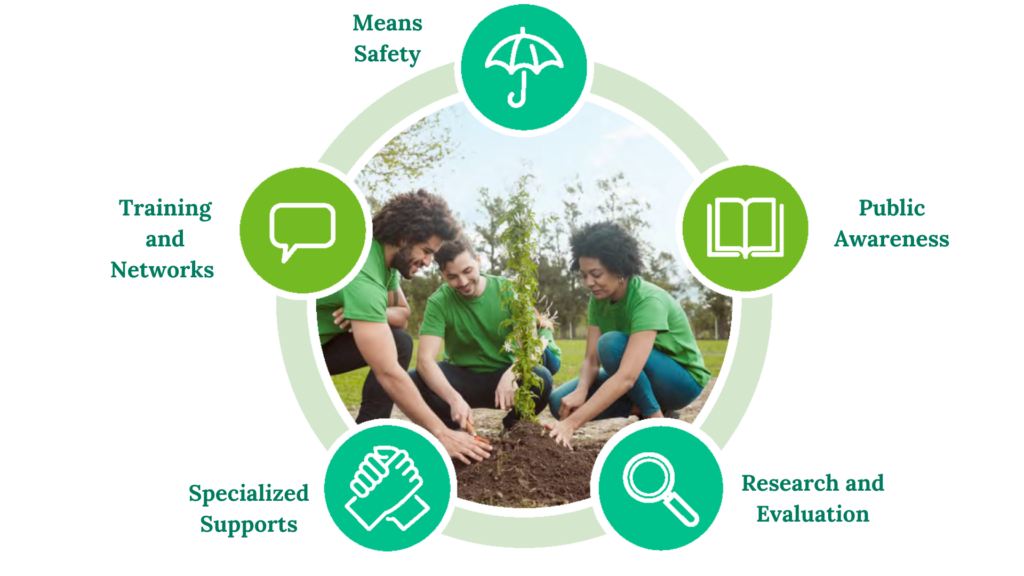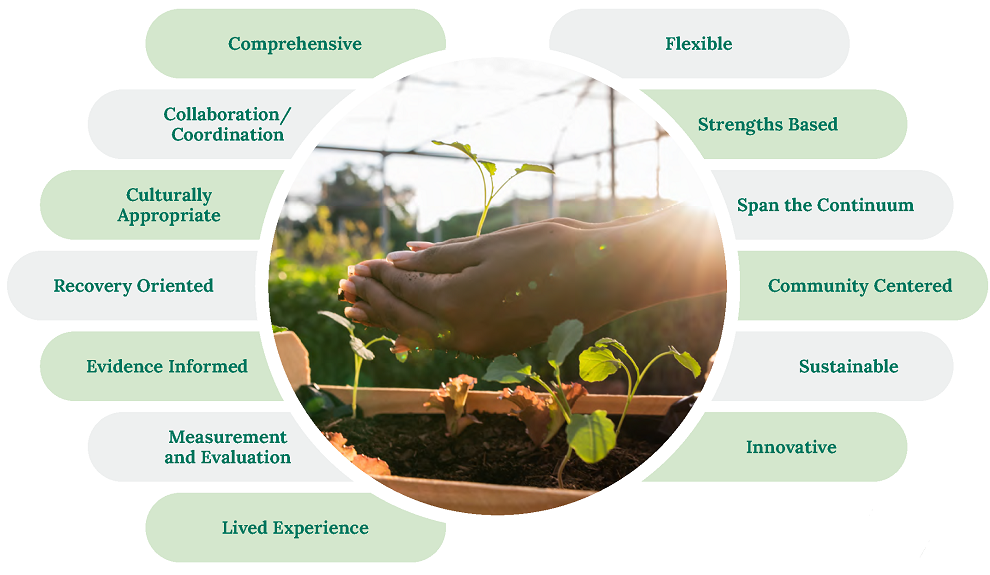Roots of Hope: A community suicide prevention model
Join the conversation on Twitter: #RootsofHope
Reducing suicide and its impact
Since 2018, communities across Canada reduce the impact of suicide by adapting the Roots of Hope model to their local contexts. The model builds on community expertise to implement suicide prevention and life promotion initiatives based on 5 pillars and 13 guiding principles.
The 5 pillars
- Means Safety. Working to limit access to methods while identifying and addressing “hot spots” in the community.
- Public Awareness. Educational efforts – developed locally and based on community context – to increase help-seeking behaviours and reduce stigma around suicide.
- Research and Evaluation. Engaging in activities that expand the Canadian suicide prevention evidence base.
- Specialized Supports. A range of activities supporting specific populations or needs in prevention, intervention, and postvention.
- Training and Networks. Training and learning opportunities for gatekeepers and leaders in the community.

The 13 guiding principles:
- Comprehensive. Use multiple interventions geared toward a wide range of individuals across a variety of settings.
- Collaboration/Coordination. Design programs to enhance collaboration among stakeholders.
- Culturally Appropriate. Develop, implement, and evaluate interventions that respect a diversity of cultures and are responsive and appropriate (for the overall community and specific sub-populations).
- Recovery-Oriented. Focus suicide prevention efforts on giving people hope, treating them with dignity, and meaningfully including them in the decisions being made.
- Evidence-Informed. Use evidence‑informed interventions, selected and informed by different kinds of evidence, including those outside of peer‑reviewed quantitative studies.
- Measurement and Evaluation. Measure outcomes and evaluate interventions to determine their effectiveness and inform future innovations.
- Lived Experience. Recognize the important role of suicide attempt and suicide loss survivors, persons with lived experience, individuals bereaved by suicide, and caregivers in guiding suicide prevention efforts.
- Flexible. While standardization is important when comparing communities or tracking progress over time, be sure that selected interventions can be tailored to the community for which they are being implemented.
- Strengths-Based. Build on existing strengths rather than on identifying and closing gaps.
- Span the Continuum. Address suicide across the entire spectrum, including prevention, intervention, and postvention services.
- Community Centered. Develop initiatives that are community-led, tailored to its current level of readiness, and driven by engaging and empowering local stakeholders.
- Sustainable. Design initiatives that allow for continued funding and leadership.
- Innovative. Attempt, evaluate, and share creative and innovative ideas to advance suicide prevention efforts globally.

National Community of Practice (NCoP)
The Roots of Hope NCoP is Canada’s first National Community of Practice for community-led approaches to suicide prevention and life promotion. The NCoP brings Roots of Hope communities together to engage in peer-to-peer support and connect representatives, researchers, regional stakeholders, and people with lived experience to help advance implementation and action plans and inform future of Roots of Hope initiatives.
We see these connections as a way for each community to sustain their local momentum while participating in a national movement and conversation on suicide prevention and life promotion.
Benefits:
- Increasing connections and collaboration with like-minded and resourceful representatives
- Exchanging knowledge, best practices, ideas, and evaluation plans
- Accessing new and existing tools and resources
- Engaging in collaborative strategic discussions with us on community action plans
- Receiving our support on links and feedback on future funding opportunities.
- Connecting to other opportunities such as research, events, webinars, training, and workshops
To learn more about the NCoP read our fact sheet.
Learn more:
Watch our Roots of Hope Community Voices video series. to see what communities, researchers, and leaders are saying.
Read our case studies to see what communities are doing.
Read our latest Annual Impact Report which shares recent Roots of Hope success in communities across Canada.
Our project backgrounder provides a comprehensive description of the model, outlines community initiatives and addresses commonly asked questions
Email us at rootsofhope@mentalhealthcommission.ca for more information or to learn more about becoming part of the Roots of Hope community.
Roots of Hope Communities:
- Sooke-West Shore, B.C
- Medicine Hat, Alta.
- Stony Plain/Tri-Region, Alta.
- Edmonton, Alta.
- La Ronge, Sask.
- Prince Albert, Sask
- North Battleford, Sask
- Meadow Lake, Sask.
- Former Keewatin Yatthé Region, Sask.
- Saskatchewan
- Flin Flon, Man.
- Halton, Ont.
- Hamilton, Ont.
- Waterloo, Ont.
- Wellington County, Ont.
- Windsor-Essex, Ont.
- New Brunswick
- Madawaska-Victoria, N.B.
- Northern Zone, N.S.
- Burin Peninsula, N.L.
- Newfoundland and Labrador
- Yukon